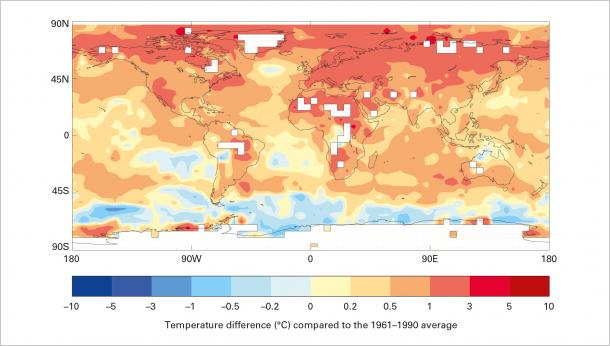The global climate 2011-2015: hot and wild
 2016-11-11 (IPMA)
2016-11-11 (IPMA)
The World Meteorological Organization has published a detailed analysis of the global climate 2011-2015 – the hottest five-year period on record - and the increasingly visible human footprint on extreme weather and climate events with dangerous and costly impacts.
The record temperatures were accompanied by rising sea levels and declines in Arctic sea-ice extent, continental glaciers and northern hemisphere snow cover.
All these climate change indicators confirmed the long-term warming trend caused by greenhouse gases. Carbon dioxide reached the significant milestone of 400 parts per million in the atmosphere for the first time in 2015, according to the WMO report which was submitted to U.N. climate change conference.
DOC also examines whether human-induced climate change was directly linked to individual extreme events. Of 79 studies published by the Bulletin of the American Meteorological Society between 2011 and 2014, more than half found that human-induced climate change contributed to the extreme event in question. Some studies found that the probability of extreme heat increased by 10 times or more.
“The Paris Agreement aims at limiting the global temperature increase to well below 2 ° Celsius and pursuing efforts towards 1.5 ° Celsius above pre-industrial levels. This report confirms that the average temperature in 2015 had already reached the 1°C mark. We just had the hottest five-year period on record, with 2015 claiming the title of hottest individual year. Even that record is likely to be beaten in 2016,” said WMO Secretary-General Petteri Taalas.
“The effects of climate change have been consistently visible on the global scale since the 1980s: rising global temperature, both over land and in the ocean; sea-level rise; and the widespread melting of ice. It has increased the risks of extreme events such as heatwaves, drought, record rainfall and damaging floods,” said Mr Taalas.

